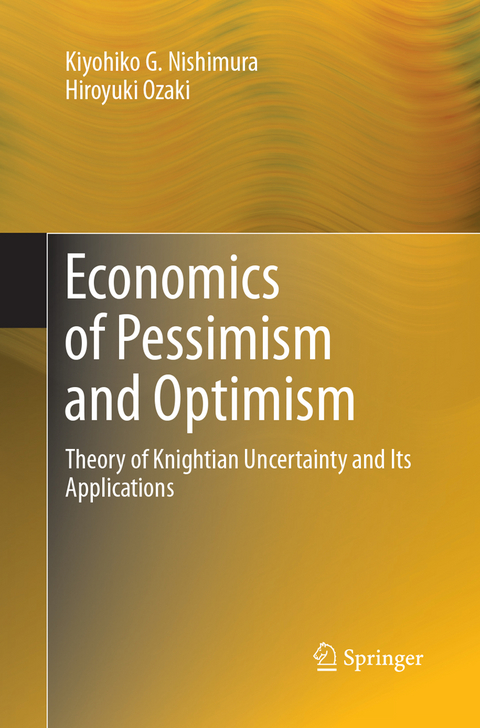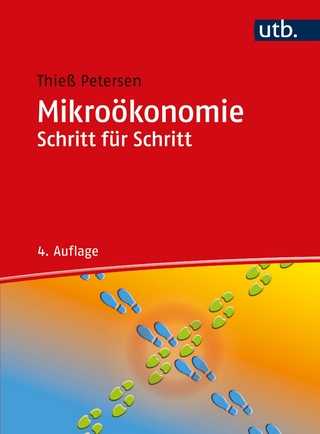
Economics of Pessimism and Optimism
Springer Verlag, Japan
978-4-431-56725-7 (ISBN)
Kiyohiko Nishimura is Professor at the National Graduate Institute for Policy Studies (GRIPS) and Professor Emeritus and Distinguished Project Research Fellow of the Center for Advanced Research in Finance at The University of Tokyo. Hiroyuki Ozaki is Professor of Economics at Keio University.
Kiyohiko G. NishimuraKiyohiko G. Nishimura is emeritus professor of economics and distinguished project research fellow at The University of Tokyo and a professor of economics in the National Graduate Institute for Public Policy (GRIPS). Before returning to academia, he was deputy governor of the Bank of Japan for 5 years until March 19, 2013, one of the most turbulent periods in the history of the world economy and central banking. He received his B.A. (1975) and M.A. (1977) from The University of Tokyo and his Ph.D. (1982) from Yale University. He was associate professor (1983–1994) and professor (1994–2005). He joined the Bank of Japan as a Member of its Policy Board (2005–2008), and then as deputy governor (2008–2013). He was dean of the Graduate School of Economics at The University of Tokyo (2013–2015). Since February 2014, he has been chairman of the Statistics Commission of the Government of Japan. He received the Nikkei Prize in 1993, the Japan Economist Prize in 1997, and the TELECOM Social Science Award in 2006. He was also the winner of the Japanese Economic Association Nakahara Prize in 1998 for his outstanding international contribution to mathematical economics and economic theory. He was awarded Emperor ’s Medal of Honor with Purple Ribbon in 2015 for his outstanding contribution to theoretical economics. Hiroyuki Ozaki Hiroyuki Ozaki is professor of economics at Keio University. He has been particularly active in developing the theory of dynamic decision making, where non-additive probability measures are used, with applications to elucidation of macroeconomic phenomena that are hard to explain in the traditional additive probability framework. He received his B.A. (1986) from Keio University and his Ph.D. (1992) from The University of Wisconsin at Madison, where he majored in economics and minored in mathematics. He was assistant professor at The University of Western Ontario (1993–1996) and associate professor at Tohoku University (1996–2005) before joining the Faculty of Economics at Keio University in 2005. He has been professor at Keio University since then. Dr. Ozaki’s academic research focuses on mathematical economics and the decision-theoretic foundation of economic agents’ behavior. Among his numerous contributions to this field, most notable is: "Dynamic programming for non-additive stochastic objectives," Journal of Mathematical Economics 25 (1996), 391–442 (with Peter A. Streufert), which developed powerful tool kits for dynamic analyses that can be available in a very general economic environment.
1 Overall Introduction.- 2 Mathematics for Reading Later Chapters.- 3 Decision-Theoretic Foundations of Knightian Uncertainty.- 4 Portfolio Inertia.- 5 Equilibrium Indeterminacy in Arrow-Debreu Economy with Knightian Uncertainty.- 6 Monetary Equilibria and Knightian Uncertainty.- 7 Dynamic Programming.- 8 Dynamic Asset Pricing.- 9 Search and Knightian Uncertainty.- 10 Irreversible Investment and Knightian Uncertainty.- 11 Liquidity Preference and Knightian Uncertainty.- 12 A Simple Characterization of Pessimism and Optimism: e-Contamination Versus e-Exuberance.- 13 Persistent Pessimism and Optimism in Forecasts: Implicit Means and Law of Iterated Integrals.- 14 Learning Under Knightian Uncertainty.- 15 Areas of Further Research.- Appendix Proofs of Lemmas and Theorems.- Index.
| Erscheint lt. Verlag | 4.9.2018 |
|---|---|
| Zusatzinfo | 12 Illustrations, color; XX, 326 p. 12 illus. in color. |
| Verlagsort | Tokyo |
| Sprache | englisch |
| Maße | 155 x 235 mm |
| Themenwelt | Wirtschaft ► Volkswirtschaftslehre ► Mikroökonomie |
| ISBN-10 | 4-431-56725-9 / 4431567259 |
| ISBN-13 | 978-4-431-56725-7 / 9784431567257 |
| Zustand | Neuware |
| Haben Sie eine Frage zum Produkt? |
aus dem Bereich


